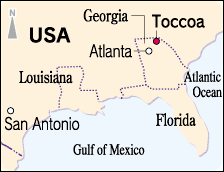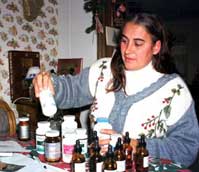April 9th, 2000
  One by one, Picou picks up bottles of vitamins
and natural minerals to explain the purpose
of each. (Toccoa, Georgia) One by one, Picou picks up bottles of vitamins
and natural minerals to explain the purpose
of each. (Toccoa, Georgia) |
| Immunity lost at the front Seeks healing in enemy territory |
Carol Picou (43) lives in a home perched alone on a hill outside the town of Toccoa, located about two hours northeast of Atlanta, Georgia by car.
"What do you think? Isn't it a nice view? The air's clean too. My family moved up here from Louisiana three years ago for my health." As Picou spoke, her eyes moved to the distant mountains extending in every direction.
As she ushered me into the remodeled, single-story farmhouse, my eye was caught by the pill bottles lined up on the table. "Are you surprised? Those aren't medicines. They're various kinds of vitamins and natural minerals." She picked up each bottle and explained what it was.
Since April 1999, she's also been seeing a private doctor in Florida, who uses homeopathy, a treatment method that utilizes the body's natural healing power. She eats only organic foods, primarily organic vegetables. "After being contaminated with chemicals, depleted uranium, and other toxins, my body lost its immunity. Until April of last year I couldn't even stand up. Now I can do light exercise."
At the age of 16, Picou was working as a model. At 22, she joined the army "to serve my country." When the Gulf War broke out in 1991, Picou lived in San Antonio, a city containing a number of military medical research organizations. Called up as a Combat Support Army Nurse, she departed for the front, leaving behind husband Anthony (now 41) and son Pierce (now 13).
When the land war began (February 24), the unit reduced its 300 troops and field cots by half and went to the front. They traveled down the "Highway of Death" where the fiercest battles were fought and opened a field hospital on the side of the road. They treated everyone who arrived: American soldiers injured by friendly fire, captured Iraqi soldiers, and Iraqi civilians who lived in the battlefield region.
"Killing people there, rescuing them here. I was constantly aware of that contradiction as I did my job. It was horrible, unbearable as a medical worker to see the gruesome-looking corpses." Picou sighed deeply as she showed me pictures of the wounded.
After the war ended, her unit remained in southern Iraq until early April. By that time, the muscles in the lower half of Picou's body no longer functioned properly, and she was incontinent.
Her digestive system had virtually stopped functioning. It might have been the pyridostigmine (PB), which many were forced to take in large quantities in preparation for chemical warfare. It might have been the biological warfare vaccines or the highly toxic depleted uranium particles she inhaled, but when she returned to San Antonio, Texas, at the end of April, her thyroid gland went into paralysis. She opted to have an operation that sterilized her to prevent having a child with birth defects due to heavy toxic exposures. In 1992, Picou began using a catheter to urinate.
"My husband works for a company, but I used up all our savings trying to find the cause of my disease. All the military did for me was provide diapers and a catheter."
Of the 150 members of her unit, around 40 are seriously ill. More than ten have died.
She was discharged in 1995. Because of her open criticism that the Department of Defense and the Veterans' Administration were attempting to cover up the facts, she was subjected to wire-tapping and other forms of harassment. But Picou refused to be intimidated.
"I was a nurse saving lives, just like a doctor, but I was part of the war machine bringing destruction. I want to use what's left of my life not for destruction but for healing. I may not be able to do much with this body, though..."
Picou visited Iraq in 1997 and 1998. If her health permits, she wants to visit again to deepen rapport with the people of Iraq for healing and peace.